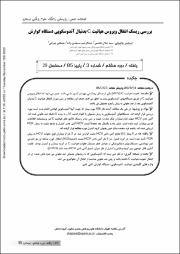Risk of Hepatitis C Virus transmission Following Upper Gastrointestinal Endoscopy
(ندگان)پدیدآور
Hajiani, eskandarHashemi, seyed jalalMasjedi-zade, abdolrahimCheraghi, mostafaنوع مدرک
TextResearch
زبان مدرک
Englishچکیده
Background: Hepatitis C virus infection (HCV) is a main health problem in our country. It is thought that the transmission of hepatitis C virus (HCV) through the endoscopic procedures is a rare event. The aim of this study was to evaluate the risk of conventional disinfection in the transmission of HCV.
Materials and methods: A prospective study, comprising 456 consecutive upper gastrointestinal endoscopies was carried out in our endoscopy centers by using conventional disinfection (exposure of the endoscope to 2% glutaraldehyde for 4 minutes),Without altering the routine procedures. Anti-HCV antibodies were tested for all patients and a questionnaire was fulfilled by the patients to obtain information regarding the risk factors for HCV infection. Six months and one year later anti-HCV antibodies were repeated and positive results were confirmed by the PCR method.Five hundred healthy blood donors were used for the control group.
Results: Five patients (1.09%) were anti-HCV-antibody positive. Anti-HCV-antibody-positive patients confirmed in three patients by PCR method . Anti-HCV antibodies were found in 6 healthy blood donors (1.2%) of controls.Transfusion, non-intravenous (i.v.) drug abuse, dental procedures, were found to be independent risk factors of HCV-positive the patients and controls groupsNo significant differences were observed between the patients and controls groups regarding the frequency of anti-HCV antibodies (P = 0.74).
Conclusion: HCV does not seem to transmit through the endoscopic procedures. Conventional disinfection of the endoscope and accessories is sufficient for prevention of HCV transmission.
کلید واژگان
HepatitisEndoscopy
Gastrointestinal system
Antibody
شماره نشریه
3تاریخ نشر
2006-11-011385-08-10





